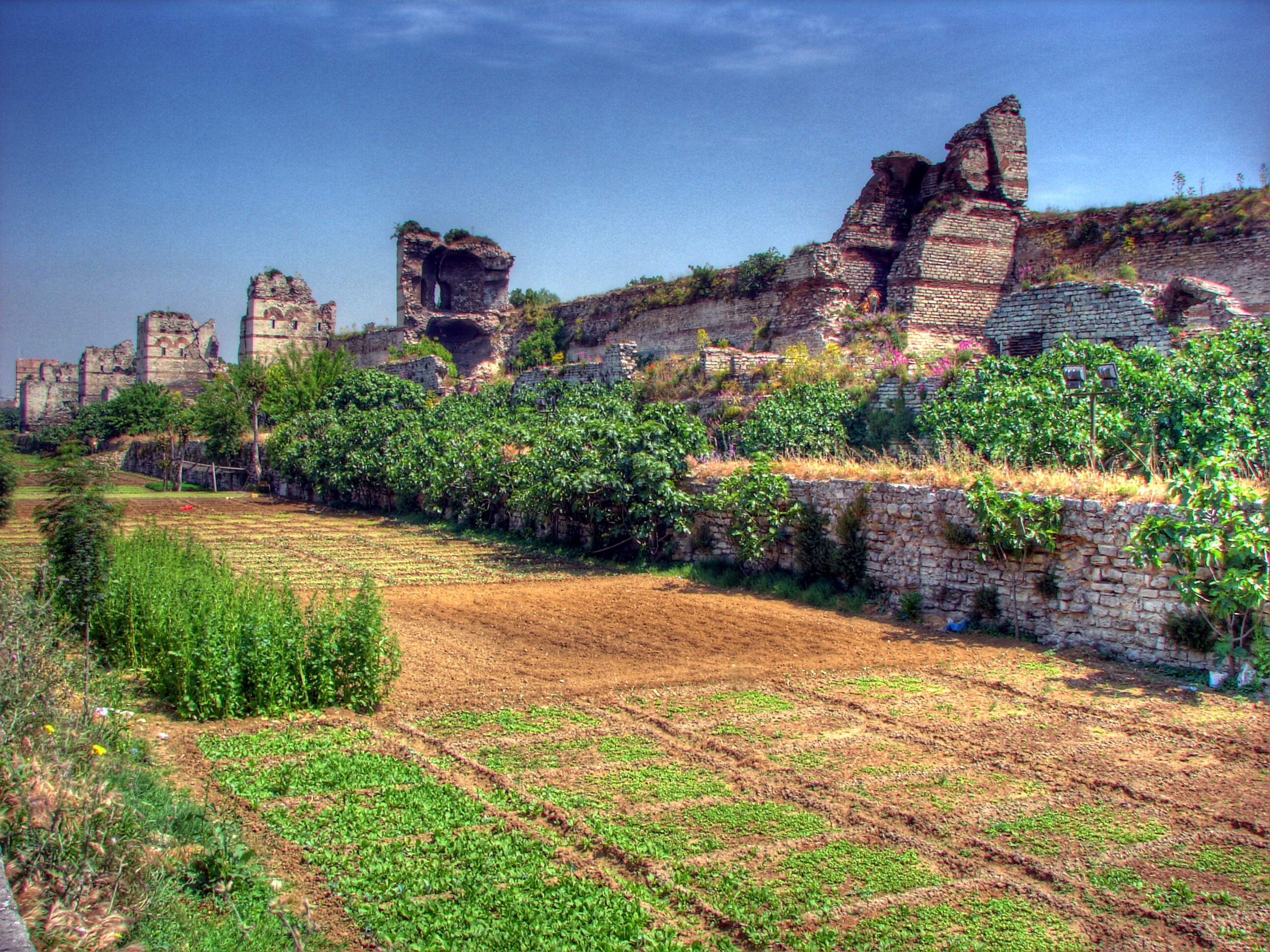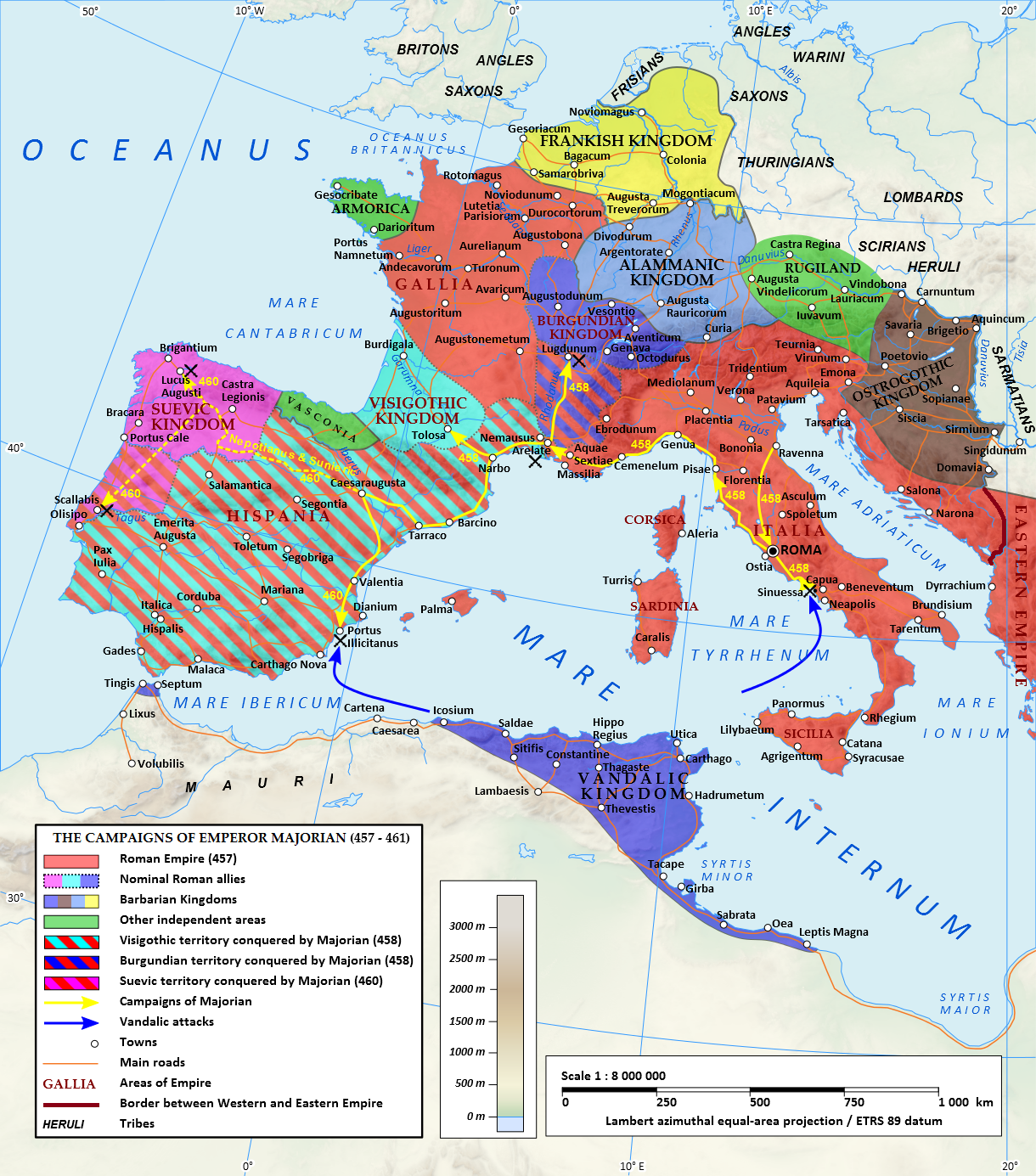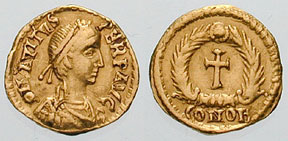|
Constantine (consul 457)
Flavius Constantinus ( 447–464) was a politician of the Eastern Roman Empire, consul and three times praetorian prefect of the East. Life A native of Laodicea of Phrygia, Constantinus was named praetorian prefect of the East for the first time around 447, when he restored the Walls of Constantinople, which had been damaged by an earthquake that January. As the Huns of Attila were moving towards Constantinople, Constantinus mobilised the factions of the Hippodrome of Constantinople to gather 16,000 workers: the Blues worked the stretch of walls from the Gate of Blachernae to the Gate of Myriandrion, the Greens from there to the Sea of Marmara; in sixty days, by the end of March, the walls were restored and the moat cleaned. A bilingual inscription was erected to celebrate the works. While in office, he received a letter from Theodoret of Cyrrhus, asking for a reduction of the taxation on his city, while another was received after he left office. After leaving office in 4 ... [...More Info...] [...Related Items...] OR: [Wikipedia] [Google] [Baidu] |
Eastern Roman Empire
The Byzantine Empire, also referred to as the Eastern Roman Empire or Byzantium, was the continuation of the Roman Empire primarily in its eastern provinces during Late Antiquity and the Middle Ages, when its capital city was Constantinople. It survived the fragmentation and fall of the Western Roman Empire in the 5th century AD and continued to exist for an additional thousand years until the fall of Constantinople to the Ottoman Empire in 1453. During most of its existence, the empire remained the most powerful economic, cultural, and military force in Europe. The terms "Byzantine Empire" and "Eastern Roman Empire" were coined after the end of the realm; its citizens continued to refer to their empire as the Roman Empire, and to themselves as Romans—a term which Greeks continued to use for themselves into Ottoman times. Although the Roman state continued and its traditions were maintained, modern historians prefer to differentiate the Byzantine Empire from Ancient ... [...More Info...] [...Related Items...] OR: [Wikipedia] [Google] [Baidu] |
Peroz I
Peroz I ( pal, 𐭯𐭩𐭫𐭥𐭰, Pērōz) was the Sasanian King of Kings () of Iran from 459 to 484. A son of Yazdegerd II (), he disputed the rule of his elder brother and incumbent king Hormizd III (), eventually seizing the throne after a two-year struggle. His reign was marked by war and famine. Early in his reign, he successfully quelled a rebellion in Caucasian Albania in the west, and put an end to the Kidarites in the east, briefly expanding Sasanian rule into Tokharistan, where he issued gold coins with his likeness at Balkh. Simultaneously, Iran was suffering from a seven-year famine. He soon clashed with the former subjects of the Kidarites, the Hephthalites, who possibly had previously helped him to gain his throne. He was defeated and captured twice by the Hephthalites and lost his recently acquired possessions. In 482, revolts broke out in the western provinces of Armenia and Iberia, led by Vahan Mamikonian and Vakhtang I respectively. Before Peroz could que ... [...More Info...] [...Related Items...] OR: [Wikipedia] [Google] [Baidu] |
Imperial Roman Consuls
Imperial is that which relates to an empire, emperor, or imperialism. Imperial or The Imperial may also refer to: Places United States * Imperial, California * Imperial, Missouri * Imperial, Nebraska * Imperial, Pennsylvania * Imperial, Texas * Imperial, West Virginia * Imperial, Virginia * Imperial County, California * Imperial Valley, California * Imperial Beach, California Elsewhere * Imperial (Madrid), an administrative neighborhood in Spain * Imperial, Saskatchewan, a town in Canada Buildings * Imperial Apartments, a building in Brooklyn, New York * Imperial City, Huế, a palace in Huế, Vietnam * Imperial Palace (other) * Imperial Towers, a group of lighthouses on Lake Huron, Canada * The Imperial (Mumbai), a skyscraper apartment complex in India Animals and plants * ''Cheritra'' or imperial, a genus of butterfly Architecture, design, and fashion * Imperial, a luggage case for the top of a coach * Imperial, the top, roof or second-storey compartmen ... [...More Info...] [...Related Items...] OR: [Wikipedia] [Google] [Baidu] |
Correspondents Of Theodoret
A correspondent or on-the-scene reporter is usually a journalist or commentator for a magazine, or an agent who contributes reports to a newspaper, or radio or television news, or another type of company, from a remote, often distant, location. A foreign correspondent is stationed in a foreign country. The term "correspondent" refers to the original practice of filing news reports via postal letter. The largest networks of correspondents belong to ARD (Germany) and BBC (UK). Vs. reporter In Britain, the term 'correspondent' usually refers to someone with a specific specialist area, such as health correspondent. A 'reporter' is usually someone without such expertise who is allocated stories by the newsdesk on any story in the news. A 'correspondent' can sometimes have direct executive powers, for example a 'Local Correspondent' (voluntary) of the Open Spaces Society (founded 1865) has some delegated powers to speak for the Society on path and commons matters in their area ... [...More Info...] [...Related Items...] OR: [Wikipedia] [Google] [Baidu] |
Byzantine Diplomats
The Byzantine Empire, also referred to as the Eastern Roman Empire or Byzantium, was the continuation of the Roman Empire primarily in its eastern provinces during Late Antiquity and the Middle Ages, when its capital city was Constantinople. It survived the fragmentation and fall of the Western Roman Empire in the 5th century AD and continued to exist for an additional thousand years until the fall of Constantinople to the Ottoman Empire in 1453. During most of its existence, the empire remained the most powerful economic, cultural, and military force in Europe. The terms "Byzantine Empire" and "Eastern Roman Empire" were coined after the end of the realm; its citizens continued to refer to their empire as the Roman Empire, and to themselves as Romans—a term which Greeks continued to use for themselves into Ottoman times. Although the Roman state continued and its traditions were maintained, modern historians prefer to differentiate the Byzantine Empire from Ancient Rome ... [...More Info...] [...Related Items...] OR: [Wikipedia] [Google] [Baidu] |
5th-century Roman Consuls
The 5th century is the time period from 401 ( CDI) through 500 ( D) ''Anno Domini'' (AD) or Common Era (CE) in the Julian calendar. The 5th century is noted for being a period of migration and political instability throughout Eurasia. It saw the collapse of the Western Roman Empire, which came to an end in 476 AD. This empire had been ruled by a succession of weak emperors, with the real political might being increasingly concentrated among military leaders. Internal instability allowed a Visigoth army to reach and ransack Rome in 410. Some recovery took place during the following decades, but the Western Empire received another serious blow when a second foreign group, the Vandals, occupied Carthage, capital of an extremely important province in Africa. Attempts to retake the province were interrupted by the invasion of the Huns under Attila. After Attila's defeat, both Eastern and Western empires joined forces for a final assault on Vandal North Africa, but this campaign was ... [...More Info...] [...Related Items...] OR: [Wikipedia] [Google] [Baidu] |
5th-century Diplomats
The 5th century is the time period from 401 ( CDI) through 500 ( D) ''Anno Domini'' (AD) or Common Era (CE) in the Julian calendar. The 5th century is noted for being a period of migration and political instability throughout Eurasia. It saw the collapse of the Western Roman Empire, which came to an end in 476 AD. This empire had been ruled by a succession of weak emperors, with the real political might being increasingly concentrated among military leaders. Internal instability allowed a Visigoth army to reach and ransack Rome in 410. Some recovery took place during the following decades, but the Western Empire received another serious blow when a second foreign group, the Vandals, occupied Carthage, capital of an extremely important province in Africa. Attempts to retake the province were interrupted by the invasion of the Huns under Attila. After Attila's defeat, both Eastern and Western empires joined forces for a final assault on Vandal North Africa, but this campaign was a s ... [...More Info...] [...Related Items...] OR: [Wikipedia] [Google] [Baidu] |
5th-century Romans
The 5th century is the time period from 401 ( CDI) through 500 ( D) ''Anno Domini'' (AD) or Common Era (CE) in the Julian calendar. The 5th century is noted for being a period of migration and political instability throughout Eurasia. It saw the collapse of the Western Roman Empire, which came to an end in 476 AD. This empire had been ruled by a succession of weak emperors, with the real political might being increasingly concentrated among military leaders. Internal instability allowed a Visigoth army to reach and ransack Rome in 410. Some recovery took place during the following decades, but the Western Empire received another serious blow when a second foreign group, the Vandals, occupied Carthage, capital of an extremely important province in Africa. Attempts to retake the province were interrupted by the invasion of the Huns under Attila. After Attila's defeat, both Eastern and Western empires joined forces for a final assault on Vandal North Africa, but this campaign was ... [...More Info...] [...Related Items...] OR: [Wikipedia] [Google] [Baidu] |
Majorian
Majorian ( la, Iulius Valerius Maiorianus; died 7 August 461) was the western Roman emperor from 457 to 461. A prominent general of the Roman army, Majorian deposed Emperor Avitus in 457 and succeeded him. Majorian was the last emperor to make a concerted effort to restore the Western Roman Empire with its own forces. Possessing little more than Italy, Dalmatia, and some territory in northern Gaul, Majorian campaigned rigorously for three years against the Empire's enemies. His successors until the fall of the Empire, in 476–480, were actually instruments of their barbarian generals, or emperors chosen and controlled by the Eastern Roman court. After defeating a Vandal attack on Italy, Majorian launched a campaign against the Visigothic Kingdom in southern Gaul. Defeating king Theodoric II at the Battle of Arelate, Majorian forced the Goths to abandon their possessions in Septimania and Hispania and return to federate status. Majorian then attacked the Burgundian King ... [...More Info...] [...Related Items...] OR: [Wikipedia] [Google] [Baidu] |
Leo I (emperor)
Leo I (; 401 – 18 January 474), also known as "the Thracian" ( la, Thrax; grc-gre, ο Θραξ),; grc-gre, Μακέλλης), referencing the murder of Aspar and his son. was Eastern Roman emperor from 457 to 474. He was a native of Dacia Aureliana near historic Thrace. He is sometimes surnamed with the epithet "the Great" ( la, Magnus; ), probably to distinguish him from his young grandson and co-''augustus'' Leo II (). Ruling the Eastern Empire for nearly 20 years, Leo proved to be a capable ruler. He oversaw many ambitious political and military plans, aimed mostly at aiding the faltering Western Roman Empire and recovering its former territories. He is notable for being the first Eastern Emperor to legislate in Koine Greek rather than Late Latin. He is commemorated as a saint in the Eastern Orthodox Church, with his feast day on 20 January. Reign He was born in Thracia or in Dacia Aureliana province in the year 401 to a Thraco-Roman family. His Dacian origin is ... [...More Info...] [...Related Items...] OR: [Wikipedia] [Google] [Baidu] |
List Of Late Imperial Roman Consuls
A ''list'' is any set of items in a row. List or lists may also refer to: People * List (surname) Organizations * List College, an undergraduate division of the Jewish Theological Seminary of America * SC Germania List, German rugby union club Other uses * Angle of list, the leaning to either port or starboard of a ship * List (information), an ordered collection of pieces of information ** List (abstract data type), a method to organize data in computer science * List on Sylt, previously called List, the northernmost village in Germany, on the island of Sylt * ''List'', an alternative term for ''roll'' in flight dynamics * To ''list'' a building, etc., in the UK it means to designate it a listed building that may not be altered without permission * Lists (jousting), the barriers used to designate the tournament area where medieval knights jousted * ''The Book of Lists'', an American series of books with unusual lists See also * The List (other) * Listing ... [...More Info...] [...Related Items...] OR: [Wikipedia] [Google] [Baidu] |
Avitus
Eparchius Avitus (c. 390 – 457) was Roman emperor of the West from July 455 to October 456. He was a senator of Gallic extraction and a high-ranking officer both in the civil and military administration, as well as Bishop of Piacenza. He opposed the reduction of the Western Roman Empire to Italy alone, both politically and from an administrative point of view. For this reason, as Emperor he introduced several Gallic senators in the Imperial administration; this policy, however, was opposed by the senatorial aristocracy and by the people of Rome, who had suffered from the sack of the city by the Vandals in 455. Avitus had a good relationship with the Visigoths, in particular with their king Theodoric II, who was a friend of his and who acclaimed Avitus Emperor. The possibility of a strong and useful alliance between the Visigoths and Romans faded, however, when Theodoric invaded Hispania at Avitus' behest, which rendered him unable to help Avitus against the rebel Roman ge ... [...More Info...] [...Related Items...] OR: [Wikipedia] [Google] [Baidu] |







